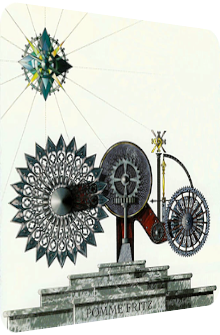
The Orb
Pomme Fritz
1994
One trivia prologue sentence: yep, the gear train machinery on the front cover displays the letters O, R and B. If you know The Orb's infamous self-titled little album called Pomme Fritz, released in 1994 on Island Records, which introductory sentence would you like to read (excluding the very first one)? How about this synopsis: The Orb's six-track mini album Pomme Fritz has sold about 100,000 copies in the United Kingdom alone in its first few weeks, is placed in the upper fifth of the Top 100 album charts for a short time, but almost universally hated by music critics as it unleashes a shocking change of formula onto their House Ambient-craving fans. Something must went horribly awry, even more so since Pomme Fritz is one of my most beloved works by the collective, and I don't just make this bold statement in order to take a stand; I truly mean it! It is a veracious collaborative effort, comprising of The Orb's nucleus Dr. Alex Paterson and Kris "Thrash" Weston, then-satellite member Thomas Fehlmann as well as the cutting-edge duo of Max Loderbauer and Tom Thiel aka Sun Electric.
As Paterson isn't tired to explicate in the past decades, Pomme Fritz – whose Germanized pun in the title derives from the original gastronomic term for French fries – contains a twofold statement, namely a return to his salad days Punk attitude when he was a roadie for the band Killing Joke, and as a reminder of the troublesome times full of management mishaps and record label changes. The supposedly angry mood is unchained on Pomme Fritz in the form of… Ambient Dub. Yep, that's the right genre description guys, no overt Punk infusions are to be found, only a wild cocktail of noises, kitchen-related samples and fried sound waves. While the whole album reuses several samples and noises time and again and can thus be seen as a remix collection of the same motif, there is enough diversity to pinpoint each composition to a certain mood and theme. Still, people did not understand the album at all, as they were waiting for further incarnations of Blue Room and Towers Of Dub. Alas, the gastronomy-related theme does not allow such inclusions, and so The Orb strike back in a forceful way, delivering a magnificent sound collage with many genuinely beautiful synth hooks which made this possibly the most experimental electronic album to ever enter the British charts in such a high spot (bar Radiohead's Kid A). It was far ahead of its time and is yet dreamy enough to consider it for an in-depth review on AmbientExotica.
The mini album launches with the onomatopoeic gibberish of a dissatisfied cook, followed by a weirdly ring-modulated synth choir. These strange – but by no means nerve-racking or audacious – sounds lead to the main frame of the opener called Pomme Fritz (Meat 'n Veg), a magnanimously dubby bassline, mellow synth washes and a possibly steel guitar-derived soothing main melody. Multitextural crystalline synth creeks accompany the clanging snares and cymbals, and once the iridescent luminosity of the galactic synth stabs occurs, they cannot even add a scent of frostiness to the kitchenette, for it is build on and bolstered by the balminess and thermal heat of the Dub infusion. This is a melodious opening track with slightly cacophonous noise particles, but these are all too whimsical at this point. So in the end, the opener is a perfectly warm Ambient Dub arrangement that culminates in the well-known blurry sample of a Saturday Night Live skit about an electroshock therapy which is happily announced by a well-groomed man. As soon as this sample is finished, the remaining minute of Pomme Fritz (Meat 'n Veg) is decidedly more favorable of plinking clangs, sizzling pans and spectral bursts.
It prepares for the things to come, as More Gills, Less Fishcakes poignantly describes the next meal gone wrong: harking back for a little while on the melody of the opener, the shaker-laden metallic glitchscpe is more on the foreground, with strongly filtered acidified chants by the Jim Jones of Jonestown admixed for… err, good measure? The up-pitched vibrato cries of cyber Indians are exchanged by bubbling kettle blebs. The ensuing silence is filled with warbled pulses whose sustain conflates with the sawtooth farts in the distance. Cowbell clangs, alienated organ grinder samples and Dub vesicles clash, the melodies are reduced to a minimum. Is this a hard-to-swallow experimental soundscape? I tend to think so, but I cannot help myself to be also keen on seeing something silky and good-mannered in them. The Orb do not throw globs of noises at the listener, but keep the rhythm structures intact. It is a somewhat great track if one is up for it.
The most effed-up tune to be ever unleashed by The Orb follows next, and it is here where I can fully sympathize with the critics: We're Pastie To Be Grill You (!) wants to fool the listener about the real meaning of a tortured, aurally raped barbershop quartet sample which actually sings "we're happy to be with you, our listeners." It is so horribly perturbed that it sounds more like the track title though, and it is sped up, stereo-panned and processed in manifold ways. This is indeed the one and only true sound collage, with piles of noises, blabbering, parrot-like croaks, laser sounds, 16-bit dripstone caves and voluminous sirens. Despite these seemingly haphazard layers, I've grown to like the experience. Seriously. As a pupil/student, I even occasionally listened to the CD while doing my homework, and once I memorized the place and timestamp of most sounds, the unique surprise level was gone, but an erudite enlightenment set in as I began to realize the plasticity, coocurrence and multiple clashing sequences of it. We're Pastie To Be Grill You is tremendously hard to like in an isolated form. But in the context of the album, it works.
The same can be said about the deep dubby ambience of Bang 'er 'n Chips, a tune which most reviewers back then do not even recognize anymore today, as it is almost annihilated by the furious noise levels of the preceding take. But it is pure gold: an actually truly poetic insight about the billions of stars out there is given by country singer Rickie Lee Jones whom the band already sampled on their dolphin-filled purple-tinted Arizona hymn Little Fluffy Clouds off their 1991 two-CD debut Adventures Beyond The Ultraworld. A two-note synth injection of the galactic kind wafts around the listener, it is magnificently texturized and sounds eminently fresh and tasty to this day. A surprisingly soft acid line is floating in adjacency to cut off-filtered wave-like shakers. While these devices make up the whole arrangement, this kind of focus is refreshing, and since the acid hooks are organically trembling and ever-changing, boredom cannot ensue. Bang 'er 'n Chips is a grand track, definitely the most reduced and soothing artifact to enter their little album.
Up next is the penultimate Alles Ist Schön (translating as everything is beautiful), the most accessible and ubiquitously hailed Ambient track by the band. This is French Filter House, but without the beats. Gorgeously rapturous three-note synth motifs are entangled, overlaid and stacked together, with many little alterations such as a little dose of blurriness here, a small portion of sharpness there, and off we go with a blissful concoction in tandem with the same Rickie Lee Jones sample that lets the absent-minded listener question the whole amount of tracks that were played beforehand. The observantly connoisseur, however, spots many fragile particles that were allotted time and again in the previous tracks; the sample of Miss Jones is only the most obvious one. Luckily, The Orb do not leave Alles Ist Schön in that blissful state for eternity, but more about it in the closing paragraph below, as there is one final and highly questionable inclusion at the end, the strange – even for the standards set in Pomme Fritz – and ephemeral His Immortal Logness which reportedly features Sun Eelctric's Tom Thiel on a fairplay organ whose reverberation meshes with ghostly laughter, sudden cannonball eruptions, dynamic whiplashes and droning motorboats. My description does not sound any stranger than before, and yet is this track curiously detached from the intrinsic soundscape. It is best to see this tune as a bonus.
It is an oxymoronic denomination to make, but Pomme Fritz is a gigantic mini album. Or if it suits your mind better, let's just say that it is a megalomaniac masterplan. Weird sounds are not just scattered all over the album, but make up the majority of it and capture its essence of bile, anger and experimentations of the aural kind. But all this mayhem is manageable for the listener, since there are beautifully shimmering synths interwoven that sound as organic as they are analog. They are fully fleshed-out, however, and have Kris Weston's handwriting as an engineer all over them. Believe me, the album is not as harsh or convoluted as the word on the streets in the London borough of Enfield may let you think. This album has become a legend of its own, and it is a feared, ridiculed and neglected one. But there are three particularly superb tunes on it: the dubby and highly melodious steel guitar-resembling celestial synth-interspersed title track Pomme Fritz (Meat 'n Veg) which provides the skeleton for all other mixes, the snugly Bang 'er 'n Chips with its cordial mystique and amicable acid airiness, and the semi-final Alles Ist Schön with its apologetic beauty and its towering synth rivers. Hailed as one of The Orb's best tracks ever created, the band recently decided to open their archives and release a two-CD version of the album with five additional mixes, one of them the excitingly grim and dark enigma as previously featured on the US-version of their 1998 Best Of album U.F.Off, with the remaining four harking back on the mellow mellifluousness of Alles Ist Schön.
One cut is a real treat, as it is the original take of Alles Ist Schön with a duration of over ten minutes! This one is too good to be true, and may cause a few people to take a look at this album again. It would be worth it. I am taking the bet that those who despise this wonky work with a deep passion remember it in a worse way. Come on, your music-related taste has grown over the years, so you might want to inspect it another time, no? In the end, it is hard for me to recommend this album. I adore it tremendously, but know it by heart for many, many years. I honestly do not know whether it can make a dent in our times nowadays. I just know that it should. It doesn't sound dated at all, but could this audiophile assertion be a good reason for new listeners to investigate in it?
Further reading:
- There is a notoriously great fan page of The Orb that lists most of the samples that have been used on their various tracks. Although the collection stops with the band's 2003 release Bicycles & Tricycles, it has a spot-on knowledge about every album before it, among them Pomme Fritz. You can find the website here.
- Follow The Orb on Twitter: @Orbinfo.
Ambient Review 148: The Orb – Pomme Fritz (1994). Originally published on Nov. 21, 2012 at AmbientExotica.com.
